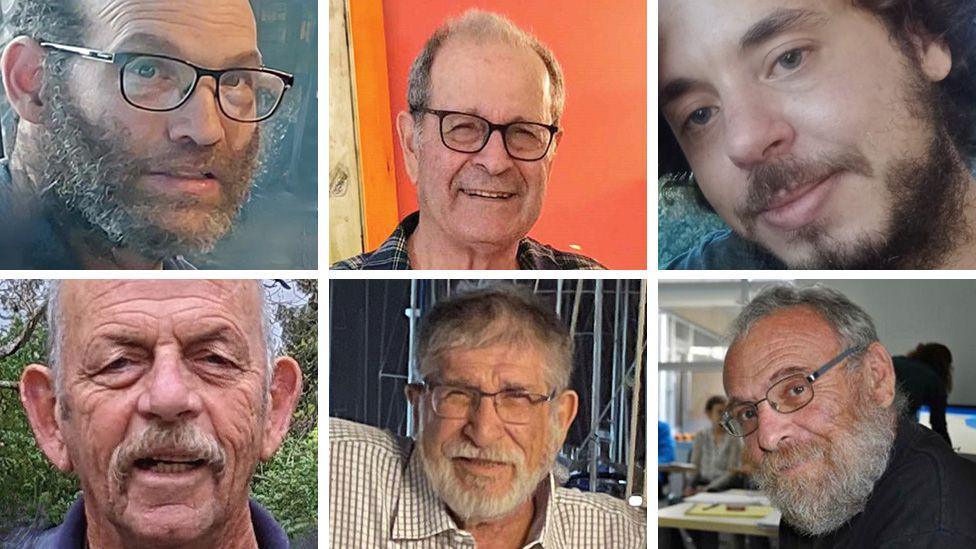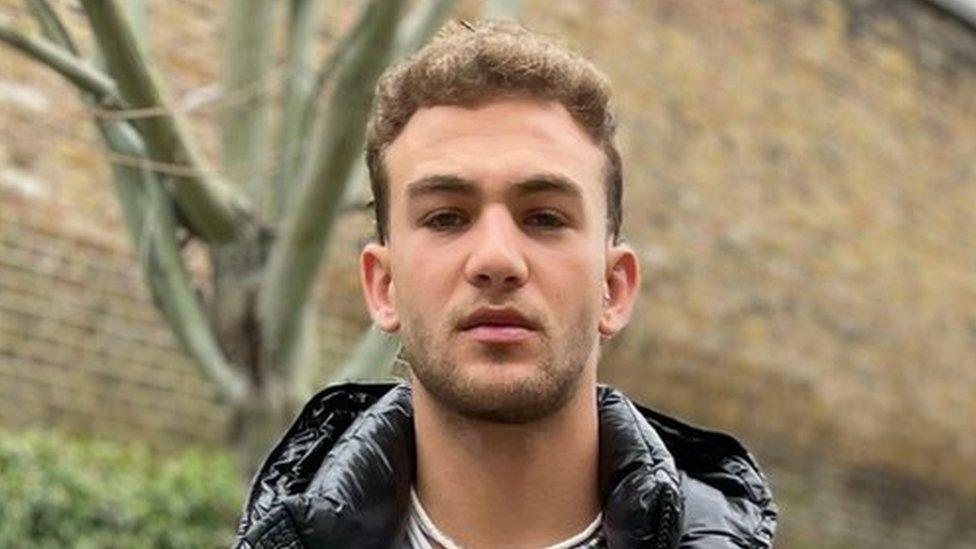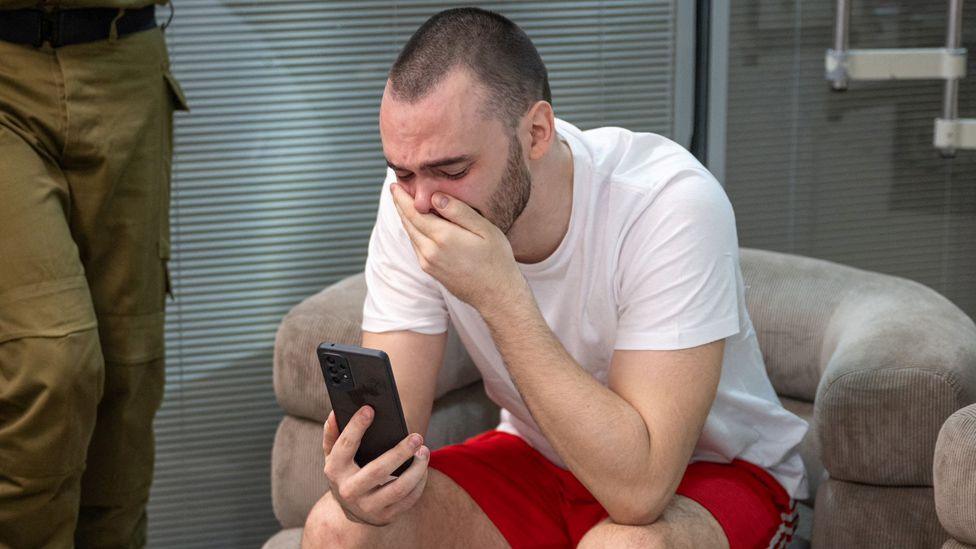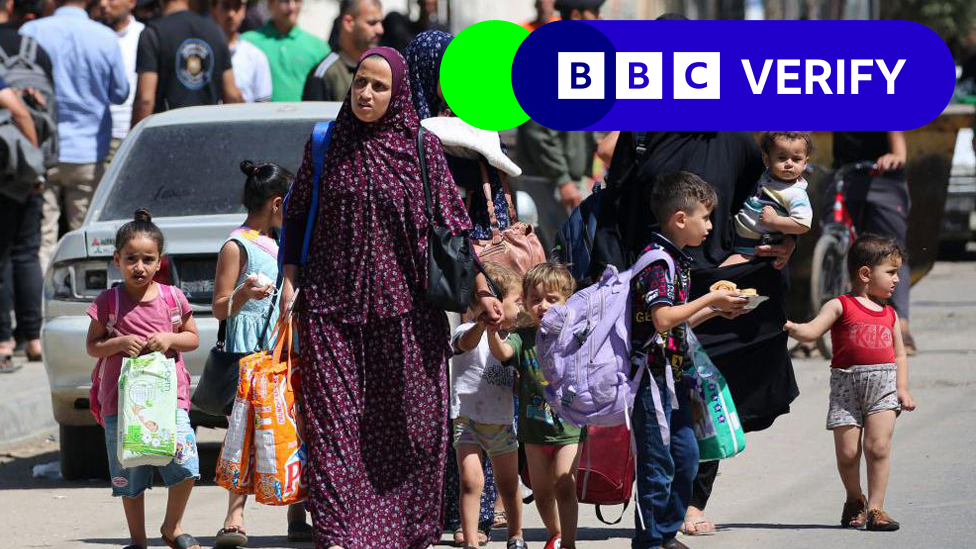Six hostages' bodies retrieved from Gaza tunnels, says IDF

Clockwise from top left: Nadav Popplewell, Avraham Munder, Yagev Buchshtab, Alex Dancyg, Yoram Metzger and Chaim Peri
- Published
The bodies of six hostages being held by Hamas have been retrieved from an "underground tunnel route" inside the Gaza Strip, Israel's military has said.
A statement from the Israel Defense Forces (IDF) said the bodies of Yagev Buchshtab, Alexander Dancyg, Avraham Munder, Yoram Metzger, Chaim Peri and British-Israeli Nadav Popplewell were recovered from the Khan Younis area on Monday.
Five of their deaths had already been announced by Israel, though it was thought Avraham Munder could still be alive.
The overnight recovery operation was carried out by the IDF alongside the security agency Shin Bet.
During the operation, the IDF said its forces located a 10m (33ft) deep tunnel shaft which led to an "underground tunnel route", inside which the bodies were found.
They were retrieved after "prolonged combat in a built-up area and in multi-story buildings".
The six men were all kidnapped from Kibbutz Nir Oz and Kibbutz Nirim, near Israel’s border fence with Gaza, during Hamas's attacks on southern Israel on 7 October.
In June, Israel confirmed the deaths of Mr Popplewell, 51, Mr Peri, 79, and Mr Metzger, 80. The IDF stated the three men had died during an Israeli operation in Khan Younis.
In July, the IDF also confirmed the deaths of Mr Buchshtab, 35, and Mr Dancyg, 76, stating an investigation was being carried out into how they died. Israeli media, citing military sources, reported at the time there was a “high probability” that at least one of the men was killed by Israeli fire.
Mati Dancyg, Alexander Dancyg’s son, said on Tuesday that Israeli Prime Minister Benjamin Netanyahu’s government had chosen to "abandon the hostages in order to survive".
"Netanyahu chose to sacrifice the hostages. Karma will judge him and he will pay for it, big time," he told Israeli public broadcaster Kan.
Government estimates suggest there are 105 hostages remaining in Gaza, 71 of whom are thought to be alive. An additional four hostages were already in Gaza prior to 7 October, two of whom are believed to be dead.
Israeli Defence Minister Yoav Gallant said in a statement the bodies were retrieved after a "complex operation", adding that Israel would keep working on “dismantling Hamas".
Israeli President Isaac Herzog said he sent “heartfelt condolences and a warm embrace” to the families of those whose bodies were returned.
"We must not stop for a moment from working in every way possible to bring back all the hostages," he added.
In a statement, the Hostage Families Forum said the recovery of the bodies had provided the families with "necessary closure", adding that the return of the remaining hostages from Gaza "can only be achieved through a negotiated deal".
The group called on the Israeli government to "do everything in its power to finalize the deal currently on the table".
Negotiations over a long-sought-after ceasefire and hostage release deal are ongoing, with US Secretary of State Antony Blinken arriving in Egypt on Tuesday to discuss a potential deal with Egyptian President Abdul Fattah al-Sisi.
On Monday, Mr Blinken said Mr Netanyahu had agreed to a US "bridging proposal" for a deal, after the pair met in Jerusalem. Mr Netanyahu described the discussion as "positive".
The IDF said on Monday that it had expanded its operation in Khan Younis, in southern Gaza, and the outskirts of the central town of Deir al-Balah.
Five people were killed in an Israeli air strike on an internet distribution facility in western Khan Younis on Monday, according to local health officials.
A medical source also told AFP news agency that three people were killed in Abasan, east of the city.
Israel launched a military campaign in Gaza in response to an unprecedented attack on southern Israel on 7 October by Hamas gunmen, during which about 1,200 people were killed and 251 taken hostage.
More than 40,173 people have been killed in Gaza since then, according to the territory's Hamas-run health ministry.
Related topics
- Published13 March 2024

- Published12 June 2024

- Published15 August 2024
